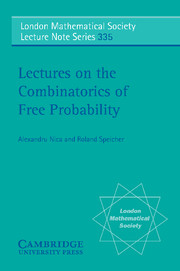Book contents
- Frontmatter
- Contents
- Introduction
- Part 1 Basic concepts
- Part 2 Cumulants
- Part 3 Transforms and models
- Lecture 16 The R-transform
- Lecture 17 The operation of boxed convolution
- Lecture 18 More on the one-dimensional boxed convolution
- Lecture 19 The free commutator
- Lecture 20 R-cyclic matrices
- Lecture 21 The full Fock space model for the R-transform
- Lecture 22 Gaussian random matrices
- Lecture 23 Unitary random matrices
- Notes and comments
- References
- Index
Lecture 22 - Gaussian random matrices
Published online by Cambridge University Press: 06 July 2010
- Frontmatter
- Contents
- Introduction
- Part 1 Basic concepts
- Part 2 Cumulants
- Part 3 Transforms and models
- Lecture 16 The R-transform
- Lecture 17 The operation of boxed convolution
- Lecture 18 More on the one-dimensional boxed convolution
- Lecture 19 The free commutator
- Lecture 20 R-cyclic matrices
- Lecture 21 The full Fock space model for the R-transform
- Lecture 22 Gaussian random matrices
- Lecture 23 Unitary random matrices
- Notes and comments
- References
- Index
Summary
In the final two lectures we want to treat one of the most important and inspiring realizations of free independence. Canonical examples for free random variables appeared in the context of group algebras of free products of groups and in the context of creation and annihilation operators on full Fock spaces. These are two (closely related) examples where the occurrence of free independence is not very surprising, because its definition was just modeled according to the situation on the group (or von Neumann) algebra of the free group.
But there are objects from a quite different mathematical universe which are also free (at least asymptotically), namely special random matrices. A priori, random matrices have nothing to do with free independence and this surprising connection is one of the key results in free probability theory. It establishes links between quite different fields.
We will present in this and the next lecture the fundamental results of Voiculescu on the asymptotic free independence of special random matrices. Our approach will be quite combinatorial and fits well with our combinatorial description of free independence. In a sense, we will show that the combinatorics of free probability theory arises as the limit N → ∞ of the combinatorics of the considered N × N random matrices.
Moments of Gaussian random variables
Random matrices are matrices whose entries are classical random variables, and the most important class of random matrices are the socalled Gaussian random matrices whose entries form a Gaussian family of classical random variables.
- Type
- Chapter
- Information
- Lectures on the Combinatorics of Free Probability , pp. 359 - 378Publisher: Cambridge University PressPrint publication year: 2006

